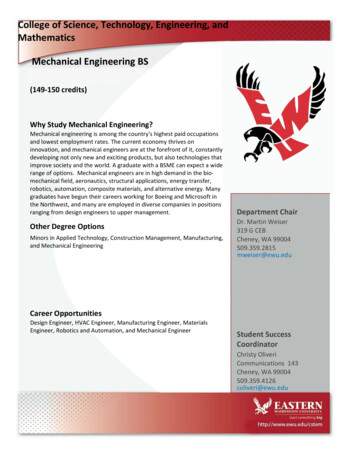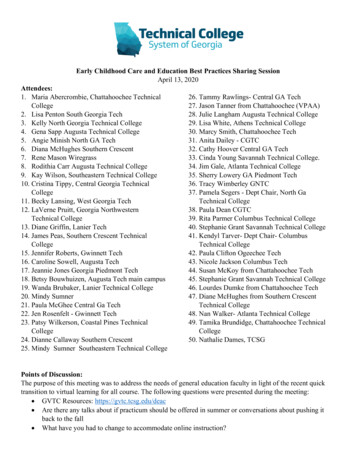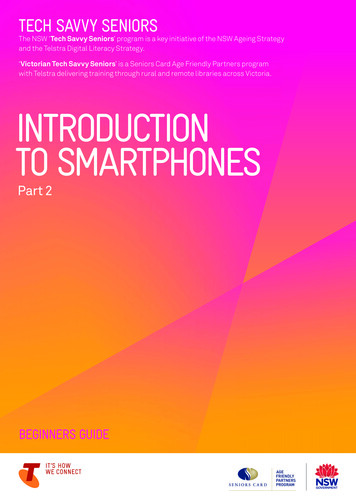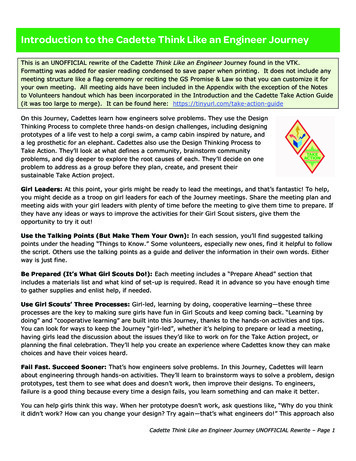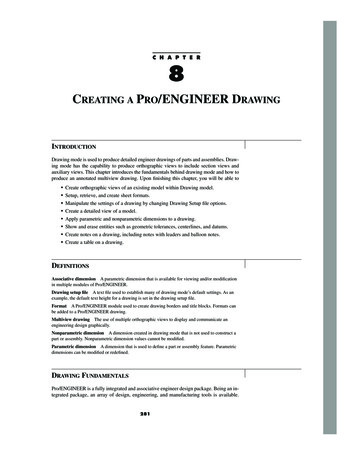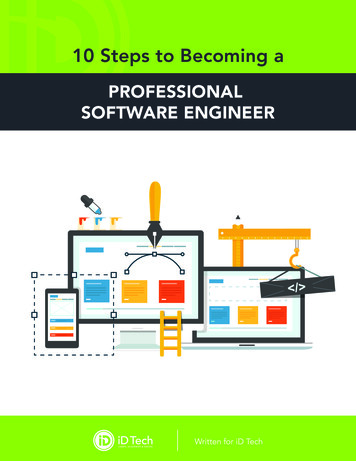
Transcription
10 Steps to Becoming aPROFESSIONALSOFTWARE ENGINEERWritten for iD Tech
10 Steps to Becoming aProfessional Software EngineerPrepare to get excited about Computer Science – it’s a dynamic field withendless opportunities for creative expression. And now is the perfect timeto get involved.Careers in ComputerScience give you theopportunity toproblem-solve, workon real-world issuesand design programsthat make peoples’lives easier everyday. It’s an incrediblyrewarding field, andit’s growing steadily.Think about the millions of iPhone and Android apps that people useevery day. Think about Facebook apps, web apps and desktop apps.Think about almost anything you do on the computer – and you’ll bethinking of the direct result of Computer Science.As STEM (Science, Technology, Engineering, and Mathematics) initiativeshave picked up steam in the educational world, industry demand fortalented Computer Scientists has also increased. Mehran Sahami, aStanford University Associate Professor of Computer Science andAssociate Chair for Education, with a corporate background at industrygiants Google and Epiphany, explains that now is the perfect time topursue training in Computer Science:“There is a great demand for skilled computer scientists, with a widevariety of careers paths to choose from. Computing pervades so manyaspects of our lives that it is becoming more and more essential foreveryone to have some facility with computing. Computer Science is afield that marries analytical thinking, problem solving, and creativity inways that help address some of our most pressing problems. Indeed, inthe future, computing will continue to impact almost all aspects of ourlives.”www.iDTech.com1do something BIG!
Ready to create your own iPhone appsor develop Android apps?And if you need a little more convincing, here are a few interesting figuresabout the job market and associated beginning salaries. CNN Moneypublished a study in January of 2012 about the previous year’s collegegraduates Entering the field of Computer Science can mean many things – you caneventually become a Programmer, a Software Engineer, or specialize in anynumber of subcategories such as mobile app development.CLASS OF 2011“The top earners of the Class of 2011 were engineering students, whowere raking in average starting salaries of 61,872 upon graduation—a1.5% increase from the previous year. Computer engineering majors werethe highest-paid of that bunch, bringing in a whopping 70,400 ayear .Computer Science graduates weren’t far behind, with the biggestincrease in pay out of all the disciplines. Students in this field landed jobswith an average starting salary of 60,594 last year, up 4.1% from 2010.”COMPUTER ENGINEERGRADUATESENGINEERINGGRADUATESAvg. starting salary: 61,872COMPUTER SCIENCEGRADUATESAvg. starting salary: 70,400Avg. starting salary: 60,594Read on to learn about the path tobecoming a professional Software Engineer1. What is a Software Engineer?2. Don’t give up. It’s hard. And rewarding.3. Start early. Take classes. Turn coding into your 6th sense.4. Develop core skills.5. Experiment. Experiment. Experiment.6. Build a portfolio with your experiments.7. Experiment some more. Seriously.8. Work with pros who are already Software Engineers.9. Contribute to open source software.10. Attend a school with a strong Computer Science program.www.iDTech.com2do something BIG!
Step 01:What is a softwareengineer?It should go without saying, but you need to know what you’re gettinginto. What is the difference between a Software Engineer and aProgrammer? The job titles can mean different things at differentcompanies and are sometimes used interchangeably, but SoftwareEngineers generally work on high-level planning and Programmers workon implementation. A Software Engineer is the architect to aProgrammer’s construction worker. Both are invaluable, and manyprofessionals wear both hats, sometimes simultaneously, over the courseof a career. Expect to do a lot of programming on your way to becominga Software Engineer.A typical day in the life of a Software Engineer caninclude:- Generating high-level project ideas- Creating a spec document and planning out projects- Coordinating with other programmers- Programming (a.k.a. coding)- Testing your programs- Fixing bugsWhat can you expect once you become a SoftwareEngineer? A rewarding career with tons of perks:- Job security- Great pay- Flexibility- Continuous growth and challengesThe U.S. Bureau of Labor Statistics projects employment in this field toincrease by 32% from 2008-2018, much faster than the average 7-13% forall occupations. This rapid industry growth is fueled by continuallyevolving technologies and increasing software needs in the businessworld. Software Engineer salaries are also impressive – 2008 data fromthe Bureau of Labor Statistics showed that the middle 50% earnedbetween 73,200 and 113,960. The highest 10% earned more than 135,780. There are many different fields to choose from once you knowyour programming – you can become a game developer, work ondesktop applications, build websites, or even become a consultant orfreelancer.Step 02:Don’t give up.It’s hard. Andrewarding.Bumps in the road are par for the course. The great thing aboutprogramming is that there is enormous diversity from project to project.You continually develop new skills and should never get bored.You can never go on autopilot. Problem solving and creativity areabsolutely vital. If you are a curious person, keep reading.Don’t become a Software Engineer because you want to cruise throughthe day. Become a Software Engineer because you love challenges andbecause obstacles only fuel your creativity.www.iDTech.com3do something BIG!
Step 03:Start early. Takeclasses. Turn codinginto your 6th sense.The best Software Engineers live and breathe code. As with any foreignlanguage, the younger you start learning, the faster it sinks in and thebetter it sticks. In today’s increasingly tech-savvy world, there are manyoptions for students who want to learn programming.One way to get a thorough introduction to programming is through aspecialized class. iD Tech Camps and iD Programming Academy offer aseries of programming courses for students as young as age seven. We’vefound that students who return year after year and build on their skillseach summer attain the best results.Popular programming courses include:iD Tech Camps-Adventures in Programming with Scratch (Scratch is a project of the MIT Media Lab )Intro to Programming with Scratch & Java Robotics Design & Visual ProgrammingProgramming in C Programming in Java iD Programming Academy-Image from Minecraft.Step 04:Develop core skills.iD Programming Labs 101iPhone & iPad App Development - Objective-C & Xcode Robotics Engineering & CodingGoogle Android App Development with Java Java for the AP Exam Web ProgrammingOf course, don’t limit yourself. Having a firm foundation in many fields oftechnology – everything from game design to 3D modeling, Flash animation and graphic design – will add to your abilities as a SoftwareEngineer. A person who knows not only how to make it work – but how tomake the navigation clean, the design crisp, and the user experience fluid– is the kind of person who will succeed.Know your stuff. Choose a basic language and get to know it inside out.After you’ve taken a course or done your own research, use yourprogramming skills as much as possible to build a working foundation foryourself. Once you understand the fundamentals, you should be able topick up new languages easily and choose whatever is best suited to aspecific project.Some common languages that Software Engineersand Programmers use:- C - Java- Visual Basic- PHP/MySQL- HTML/CSS/JavaScript- Flash/ActionScriptwww.iDTech.com4do something BIG! - Microsoft.NET- Ruby on Rails- Microsoft XNA
Step 05:Experiment.Experiment.Experiment.Build a simple website. Recreate a game. Program anything, and don’t beafraid to start small. You’re gaining experience at this stage.One of the best things about iD Tech Camps and iD ProgrammingAcademy courses are their project-based curriculum. Students work tocomplete a project by the end of each week – awesome things likeiPhone apps. And these projects are a great way to get your foot in theapp development door. Andrew took Programming (C , Java) twice asan iD Tech Camps student, and then took iPhone App Development at iDProgramming Academy. He left camp with three iPhone apps in progress,and continued experimenting after his session ended – now he has nineapps in the Apple store with over 50,000 downloads between them. Notbad for experiments, right?“Andrew took Programming (C , Java) twice as an iD Tech Camps student, andthen took iPhone App Development at iD Programming Academy. Now he has 9apps in the Apple store with over 50,000 downloads between them.”We’ve surveyed some sharp programmers and engineers, and here issome advice for the budding programmer: set aside an hour every day toprogram. By the end of a week or two, you should be able to build abasic app. If you can’t commit that much time, set aside a couple of hoursevery weekend. You can build up an app in about a month. The biggerand better the app, the more time it takes but it’s worth the effort. Theimportant thing is to be specific about your concept (the thing you wantto accomplish or the problem you want to solve) and stick to a schedule.This way you can make regular progress. Being self-motivated andsticking to a timetable are important.Step 06:Build a portfolio withyour experiments.Step 07:Experiment somemore. Seriously.Don’t keep your experiments to yourself. Put them out there. Make yourwebsites live. Publish your games. Share with the world. You want to beable to point future employers to real examples of your abilities.Best of all, when you share your projects, you get hundreds of extra eyeson your work. Someone else might catch a bug that you didn’t see, oranticipate a problem that didn’t occur to you.Notice a pattern here? Try creating something else. Build a simplecalculator. Make a desktop timer. Recreate classic arcade games likePong. Build a task list manager. Create a simple MP3 player. Make adice-rolling program.And never leave well-enough alone. It can always be better. Go back toyour old projects and make them prettier, make them faster, make themmore functional. Experimenting and using programming skills in apractical, hands-on environment is the most valuable experience that anyaspiring Software Engineer can have.www.iDTech.com5do something BIG!
Step 08:Work with pros whoare already SoftwareEngineers.If you can intern for a great programmer, do it. Put in the time for training.It’s the practice-makes-perfect principle, with an experienced programmerwatching your back to make sure that you practice in the right way. Youwill learn more watching and working with them than reading tenthousand instruction manuals.Some big-name companies that offer internships:-MicrosoftGoogleAppleEAUbisoftIBMMore and more companies are looking for up-and-coming talent. Getyour foot in the door by interning at a reputable company. The long termpayout will be worth it. They get to see you in action, and if you love whatyou do, it will show.“More and more companies arelooking for up-and-coming talent. Getyour foot in the door by interning at areputable company. The long termpayout will be worth it. ”Step 09: As your skills improve and you gain confidence, branch out and work onopen source software. You’ll be rubbing shoulders with the best.Contribute to opensource software. Look at these sites for projects that interest you:- www.gamedev.net- www.sourceforge.netwww.iDTech.com6- www.codeplex.com- source.android.comdo something BIG!
Step 10:Attend a school with astrong ComputerScience program.One of the big pluses of attending a great program is interacting withlike-minded peers. When you rub shoulders with other programmingenthusiasts at programs like iD Tech Camps and iD ProgrammingAcademy, this benefit becomes really clear. Peers in a well-organizedprogram feed off of each other and the energy becomes contagious. Ifyou can live and learn in that sort of environment, you will find inspirationand support at every corner.Some universities with prestigious computer scienceprograms (that also host iD Tech Camps andiD Programming Academy):-Massachusetts Institute of Technology (MIT)StanfordCarnegie MellonUC BerkeleyPrincetonUniversity of Wisconsin-MadisonUCLAColumbia UniversityA great way to get to know the feel of each campus is to attend summersessions there – either iD programs, or in some cases youth educationprograms sponsored by each school.After researching each school’s degree programs, also consider location.Proximity to industrial and research parks can be a huge advantage. ManyComputer Science departments have partnerships with large companies,and you may be able to get an internship or associate job duringsummers. Also, search around and sample some curriculum before youcommit to a program – many schools (such as MIT) put all or part of theirlectures online.A word of caution: A degree is only worth as much as you put into it.Some students graduate with a grasp of the basic concepts ofprogramming; some graduate with thousands of hours of actualprogramming experience. Employers will take someone with real-worldexperience over someone with fifteen different certifications. Make surethat you balance theory with practice.So does becoming a Software Engineer sound tough? It should, but don’tlet that phase you. Computer Science is an incredibly rewarding careerpath. Use these steps as a guideline and stay focused. Make yourself aschedule of classes and projects, and stick to it. Experiment, thenexperiment with your experiments. This is the beginning of a lifelonglearning journey.www.iDTech.com7do something BIG!
For more information about ourSoftware Engineer courses, visit iDTech.com. 2014 iD Tech. All rights reserved.
- Testing your programs - Fixing bugs A typical day in the life of a Software Engineer can include: - Job security - Great pay - Flexibility - Continuous growth and challenges What can you expect once you become a Software Engineer? A rewarding caree
